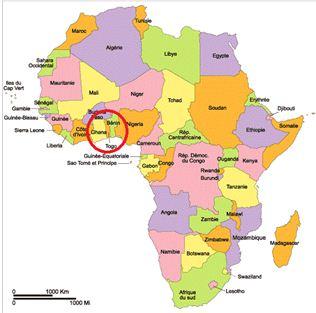Togo: A Snapshot of a West African Nation
In the heart of West Africa lies Togo, a nation rich in cultural diversity and steeped in history. From its vibrant markets to the serene beauty of its landscapes, Togo intricately weaves the threads of tradition and modernity. This article delves into the essential features of Togo, drawing insights from the concise yet comprehensive summary provided by Britannica. As the world increasingly turns its attention to the unique narratives of lesser-known countries, Togo presents a compelling story that deserves exploration — from its geography and demographics to its political landscape and economic developments. Join us as we uncover the fundamental aspects of this intriguing nation, offering a clearer understanding of its role and significance in the broader context of West African affairs.
Understanding Togo’s Political Landscape and Governance Challenges
The political landscape of Togo has been shaped significantly by its historical context and the leadership style of its long-standing ruler, Faure GnassingbĂ©. Since taking office in 2005, after the death of his father GnassingbĂ© EyadĂ©ma, the current president has faced allegations of autocracy and repression of dissent. Critics argue that the governance model in Togo remains heavily centralized, limiting the political space for opposition parties and civil society movements. The national assembly often reflects the president’s agenda more than the will of the electorate, raising concerns over democratic accountability and public participation.
In addition to the challenges of political repression, Togo grapples with pressing governance issues such as economic stability and social inequality. Key points affecting Togo’s governance include:
- Corruption: A pervasive challenge affecting various sectors, undermining trust in public institutions.
- Healthcare and education: Insufficient investment leading to disparities in access and quality.
- Human rights: Reports of abuses highlight the need for improved legal frameworks and enforcement.
Efforts to enhance governance have included international pressure for reforms and dialogue with opposition groups, but progress remains slow. As Togo approaches upcoming elections, the hope for a more inclusive political process is palpable, though skepticism persists regarding the government’s willingness to implement substantial change.
Exploring Togo’s Economic Development and Potential for Growth
Togo, a small nation on the West African coast, presents a unique landscape for economic development, characterized by its strategic location and abundant natural resources. Despite recent political challenges, the country’s government has been focusing on broadening its economic base by investing in key sectors such as agriculture, mining, and services. The following elements are critical to understanding Togo’s economic landscape:
- Agriculture: Around 60% of the population is engaged in agriculture, making it vital for employment and food security.
- Infrastructure Development: Improvements in transport and logistics are underway, aiming to enhance trade routes and connectivity.
- Mining Resources: Togo is rich in phosphates, which attracts foreign investment and boosts export potential.
- Tourism Opportunities: With coastal areas and rich cultural heritage, tourism has potential for significant growth.
Future prospects for Togo are bolstered by commitments to sustainable practices and innovation. The government’s focus on creating a business-friendly environment is evident through reforms aiming to streamline regulations and enhance the ease of doing business. Key initiatives include:
| Initiative | Description |
|---|---|
| Investment in Renewable Energy | Promoting sustainable energy to support economic activities and reduce reliance on fossil fuels. |
| Public-Private Partnerships | Encouraging private sector investment in infrastructure and service delivery to fuel growth. |
| Trade Agreements | Seeking to enhance trade relationships with regional and international partners. |
Cultural Richness and Social Dynamics: Insights into Togo’s Diverse Heritage
Togo, a small West African nation, boasts a rich tapestry of cultures and traditions that reflect its complex history and social dynamics. With over 40 ethnic groups, the country showcases a vibrant mix of languages, customs, and belief systems. Ethnic diversity is prominently displayed in the form of traditional festivals, art, and music, all of which play a pivotal role in the daily lives of Togolese people. Key groups such as the Ewe, Mina, and Tem have distinct practices that contribute to Togo’s cultural mosaic. Furthermore, traditional religions, mainly animism, coexist with major world religions like Christianity and Islam, fostering a unique spiritual landscape where ancient beliefs intertwine with modern influences.
Socially, Togo is characterized by a dynamic interplay between urban and rural populations, each contributing distinctively to national identity. Urban centers like Lomé are melting pots of modernity and tradition, often leading to a blend of lifestyles and aspirations among the youth. Meanwhile, rural communities emphasize agricultural practices and communal living, reinforcing ties that underline communal responsibilities and support systems. In the face of globalization, Togo’s rich heritage remains resilient, with initiatives aimed at preserving traditional crafts and knowledge systems, enabling a continuous dialogue between past and present. The result is a society where cultural pride fuels a deeper understanding of social processes and identity.
| Ethnic Group | Primary Language | Traditional Festival |
|---|---|---|
| Ewe | Ewe | Gahu Festival |
| Mina | Mina | Folklore Festivals |
| Tem | Tem | Harvest Celebration |
In Retrospect
In conclusion, Togo’s rich tapestry of history, culture, and economic potential offers a compelling narrative worthy of exploration. With its strategic location in West Africa and diverse landscapes, Togo presents both challenges and opportunities for development. As the nation moves forward, it continues to navigate its unique political landscape while fostering growth in sectors such as agriculture and tourism. The insights provided by this Britannica summary not only highlight the significance of Togo within the regional context but also emphasize the importance of understanding its complexities for anyone interested in African studies or global affairs. As Togo prepares for the future, it remains a vital player on the African continent, inviting further observation and engagement from the international community.







